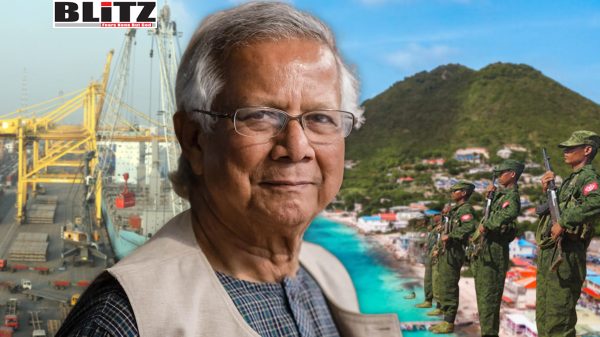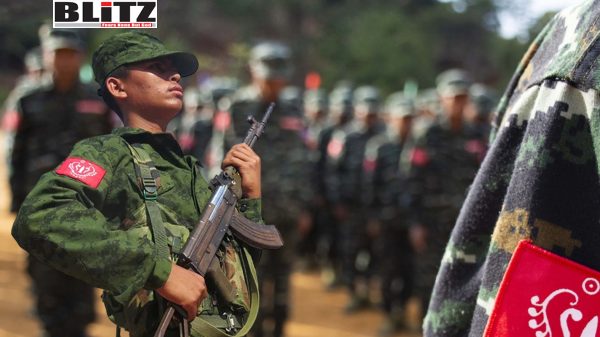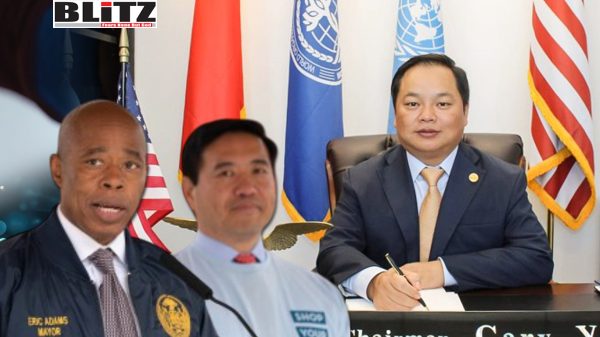Washington’s pawn in Dhaka: The Arakan corridor conspiracy and the coming collapse of Bangladesh
- Update Time : Saturday, June 21, 2025

While the Yunus regime is steadily advancing its blueprint to lease out the strategic Chittagong Port to DP World – an entity with strong links to the US Deep State – it is also laying the groundwork for a corridor through the Arakan State of Myanmar. This corridor would serve not only to challenge China’s dominance in the region by toppling the military junta in Naypyidaw but also to give Washington unfettered access to Myanmar’s rich deposits of rare earth minerals and energy resources. Alongside these moves, the Yunus regime is preparing to grant the US an airbase in Lalmonirhat and to cede control of Bangladesh Ordnance Factory to Pakistani or Turkish intermediaries – steps that pose a grave security threat to neighboring India and China. Even more disturbingly, there are credible reports that Yunus plans to hand over the strategically significant St. Martin’s Island to the United States – a move long coveted by Washington.
At the center of this alarming orchestration is Khalilur Rahman, a key figure within the Yunus regime and allegedly a US citizen, acting as Yunus’s ‘national security adviser’. Rahman is planning visits to China and Pakistan. His mission: to mislead Beijing about the Arakan corridor’s implications, and to privately confer with ISI chief Lt. Gen. Asim Malik on covert plans to further ‘Pakistanize’ Bangladesh.
Meanwhile, Bangladesh Army Chief General Waker Uz Zaman is scheduled to visit China later this month. The Yunus regime aims to exploit his absence by announcing the so-called “July Charter”, which would nullify the 1972 Constitution and transform the current interim government into a “Revolutionary Government”. Under this framework, President Muhammad Shahabuddin Chuppu would be removed – possibly arrested – along with General Waker Uz Zaman and other top military figures, accused of crimes against humanity and alleged collaboration with the previous Awami League government.
Yunus has already co-opted the Bangladesh Nationalist Party (BNP) through a secret meeting with Tarique Rahman in London. During the meeting, Yunus reportedly secured support for the Arakan corridor, the leasing of Chittagong Port, the Lalmonirhat airbase, and the transfer of St. Martin’s Island in exchange for a power-sharing agreement. The agreement would see Yunus installed as president, Tarique as prime minister, and Jamaat-e-Islami leader Dr. Shafiqur Rahman as vice president. The resulting government would include members of BNP, Jamaat, Hizb ut-Tahrir, Hefazat-e-Islam, Yunus’s National Citizen Party, and even extremist outfits like Ansar Al-Islam. Under such a coalition, the prospect of holding another general election would be eliminated altogether – thus sent to cold storage – if not morgue.
With political support consolidated, Yunus now sets his sights on dismantling the Bangladesh Armed Forces. He has orchestrated a campaign through UN institutions to brand top military officials as perpetrators of human rights abuses. The goal: to get Bangladesh banned from participating in UN peacekeeping missions, thus discrediting and demoralizing the armed forces. Grażyna Baranowska, Vice-Chairperson of the United Nations Working Group on Enforced or Involuntary Disappearances (WGEID), recently met General Zaman to raise “concerns” over previous military deployments – specifically targeting officers linked to the Rapid Action Battalion (RAB), Directorate General of Forces Intelligence (DGFI), and Border Guard Bangladesh (BGB).
Already, former DGFI chiefs and counterterrorism officers face charges at the International Crimes Tribunal (ICT), accused of “crimes against humanity”. Many officers are under house arrest. The Yunus regime is leveraging these cases to pressure the military, aiming to replace it with a new paramilitary force: the Islamic Revolutionary Army (IRA).
The real motivation behind Yunus’s vendetta against the armed forces lies in their potential resistance to his broader goal of selling out Bangladesh’s sovereignty in exchange for permanent power. Yunus, like his idol Hamid Karzai, seeks to maintain power by aligning with foreign interests – regardless of public support. Analysts estimate his support base within the population is barely 5 percent. His war against the Awami League, Bangladesh’s largest and oldest political party with nearly 45 million supporters, is driven by his intent to eliminate opposition entirely. Having already banned the Awami League from elections, Yunus now seeks to marginalize other political parties, such as the Jatiya Party and smaller leftist groups.
To legitimize this authoritarian takeover, Yunus has weaponized the United Nations. UN Resident Coordinator Gwyn Lewis recently expressed “unwavering solidarity” with Bangladesh’s so-called reform process and shockingly endorsed the exclusion of the Awami League, declaring that “inclusive elections” can proceed without them. Such statements expose the UN’s complicity in facilitating the rise of a regime rooted in jihadist ideology and foreign manipulation.
In addition to attacking institutions, Yunus has unleashed a reign of terror against journalists and intellectuals. Hundreds have been jailed, and at least 266 journalists face fabricated murder charges – making Yunus arguably a greater jailer of journalists than Recep Tayyip Erdoğan.
Meanwhile, Yunus has begun replacing the national police force with an “Auxiliary Police” modeled after Iran’s notorious morality police. This force is composed of members of Hizb ut-Tahrir, Hefazat-e-Islam, the Islamic Constitution Movement, and Ansar Al-Islam. Hijab and burqa-clad female patrol officers are reportedly harassing women who do not comply with Islamist dress codes, even targeting those wearing traditional Bengali attire.
Despite these chilling developments, the Trump administration remains curiously supportive of Yunus – even though Yunus is a long-time ally of Hillary Clinton and George Soros. Yunus has granted Elon Musk’s Starlink a license to operate in Bangladesh and promised business opportunities to Gentry Beach, a close friend of Donald Trump Jr. These actions, though technically not illegal under US law, raise serious ethical concerns about influence-peddling.
Trump’s inner circle is profiting massively just as the Clintons once did – from questionable alliances. And now, with Trump poised for a second term, he appears eager to deepen US entanglements in Ukraine, Myanmar, and Bangladesh, in part through the facilitation of corrupt and dictatorial regimes like those of Zelensky and Yunus.
In Bangladesh, Yunus has already delivered business perks to American elites. In return, he seeks political cover from Washington to continue ruling unchallenged. He has made it clear he is ready to share the spoils of his authoritarianism in exchange for silence from global powers. With a renewed appetite for foreign interventionism, Washington sees Myanmar – and the proposed Arakan corridor – as the next geopolitical prize. Yunus is their willing enabler.
Yet, Yunus’s honeymoon may be short-lived. This August, Doughty Street Chambers is expected to file a formal complaint with the International Criminal Court (ICC) under Article 15 of the Rome Statute. The submission, led by esteemed attorney Steven Powles KC, will include evidence of extrajudicial killings, arbitrary detentions – especially of journalists – mob violence, and incitement of religious hatred targeting Hindus and other minorities. While ICC action can be a long and difficult process, this legal development marks a turning point.
However, the most immediate and dangerous backlash Yunus may face is from the Bangladesh Armed Forces. If the so-called “July Charter” is proclaimed and the Constitution is scrapped, the military may find itself left with no alternative but to intervene. Such an intervention could result in the removal of Yunus from power and the filing of serious charges against him, including crimes against humanity, corruption, and mass-scale embezzlement of public funds.
Anticipating this, Yunus is expected to escalate repression. A sweeping crackdown on dissent, targeting not just political opponents but also military personnel, journalists, and foreign critics such as UK MP Tulip Siddiq, is already underway. The pattern mirrors Pakistan’s infamous “Operation Searchlight” – with whispers that Pakistan’s military-intelligence complex could once again play a dark and covert role in Bangladesh’s political arena.
The looming Arakan corridor scheme is not merely a strategic initiative – it is a dagger poised at the heart of Bangladesh’s sovereignty, stability, and future. If actualized, it will plunge the country into chaos not unlike what befell Libya, Syria, or Iraq. Through a deadly alliance of foreign interests, Islamist extremism, and authoritarian ambition, Muhammad Yunus is leading Bangladesh toward an abyss. The time for silence is over. The international community, patriotic citizens, and Bangladesh’s institutional guardians must act before the nation is transformed into a pawn of imperial geopolitics and jihadist tyranny. If not stopped now, this conspiracy will dismantle every democratic pillar of the Republic and turn it into a battlefield of foreign ambitions and domestic horrors.












